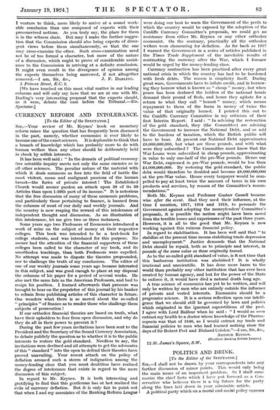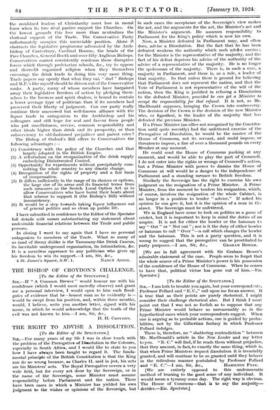POLITICS AND DRINK.
[To the Editor of the SPECTATOR.] SIR,—I shall not be drawn by your correspondents into any further discussion of minor points. This would only befog the main issues of an important problem. So I shall sum- marize the chief facts which I have put forward as a Con- servative who believes there is a big future for the party along the lines laid down in your admirable article.
A political party which on a moral and social policy opposes
the combined leaders of Christianity must lose in moral force when its two rival parties support the Churches. On the lowest grounds this loss more than neutralizes the electoral support of the Trade. The Conservative Party unfortunately occupies this unenviable position. Alone it obstructs the legislative programme advocated by the Arch- bishop of Canterbury, Cardinal Bourne, the heads of the Free Churches, General. Booth and over fifty Anglican Bishops. Conservatives cannot consistently condemn those disruptive forces which through proletarian schools, &c., try to oppose and discredit organized religion when they themselves encourage the drink trade in doing this very same thing. Trade papers say openly that what they cal i " dud " Bishops and M.P.'s like myself should be driven out of the Conservative ranks. A party, many of whose members have bargained away their legislative freedom of action by pledging them- selves to the brewers and spirit dealers, is bound to contain a lower average type of politician than if its members had preserved their liberty of judgment. Can our party really continue their unavowed but well-known alliance with the liquor trade in antagonism to the Archbishop and his colleagues and still hope for zeal and favour from people who put unselfishness, service, common responsibility and other ideals higher than drink and its prosperity, or than subserviency to old-fashioned prejudices and parrot cries ?
The Bishop of Oxford's Bill offers to Conservatives the following advantages :- (1) Consistency with the policy of the Churches and that largely adopted in the British Empire. (2) A referendum on the reorganization of the drink supply embodying Disinterested Control.
(3) Opportunity for experiments without precipitately com- mitting the whole country to any drastic change. (4) Recognition of the rights of property and a fair basis of compensation.
(5) It differs sufficiently in the range of its choices or options, the large size of its areas and its financial terms from such measures as the Scotch Local Option Act as to allow Conservatives who have burnt their boats about that scheme to support it (the Bishop's Bill) without inconsistency.
(6) It would be a step towards taking liquor influences out of general politics and so clean up public life.
I have submitted in confidence to the Editor of the Spectator full details with names substantiating my statement about undesirable financial relations between the Trade and public persons.
In closing I want to say again that I have no personal antagonism to members of the Trade. What so many of us (and of them) dislike is the Tammany-like Drink Caucus, its inevitable underground organization, its intimidation, &c. It is a merciless oppressor to any politician who gives up his freedom to win its support.—I am, Sir, &c., 4 St. James's Square, S.W .1. NANCY ASTOR.











































 Previous page
Previous page